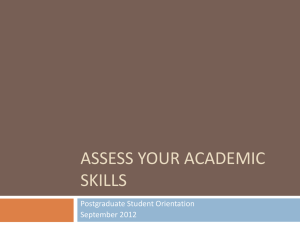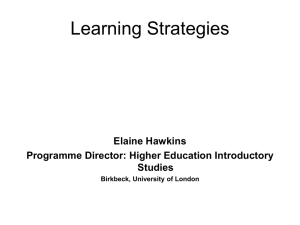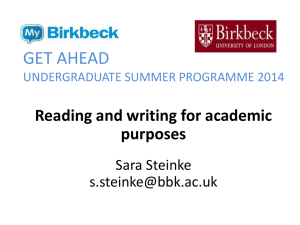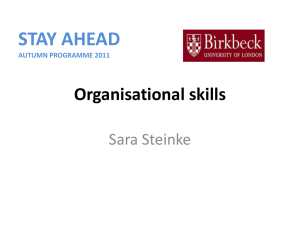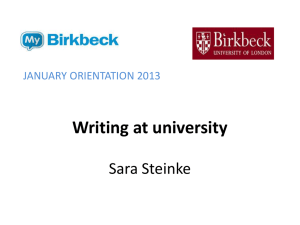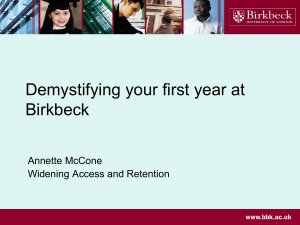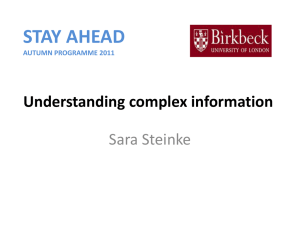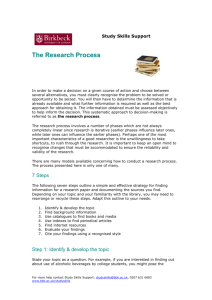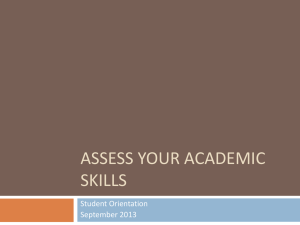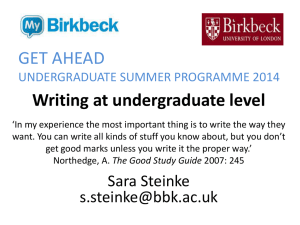Reading at undergraduate level
advertisement
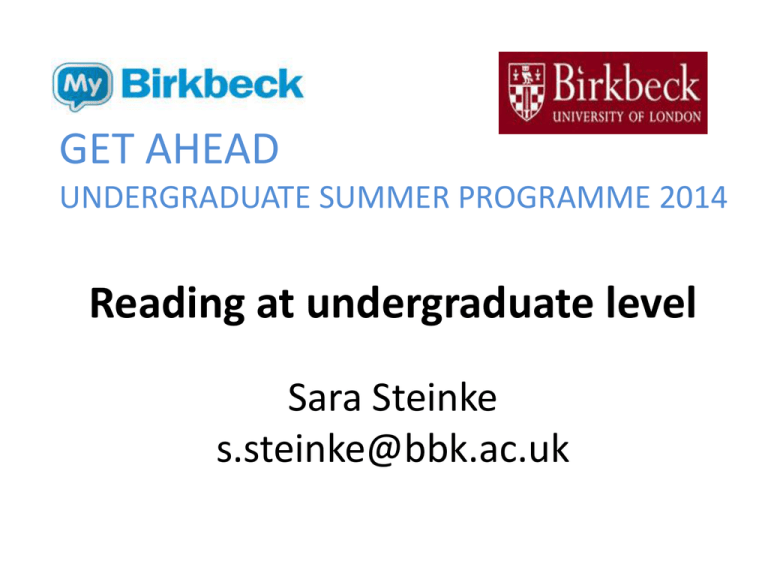
GET AHEAD UNDERGRADUATE SUMMER PROGRAMME 2014 Reading at undergraduate level Sara Steinke s.steinke@bbk.ac.uk Aims of the session • How to cope with the large amount of reading expected of you • How to increase your understanding of the reading for academic study - the importance of critical reading skills to enhance your critical thinking • To recognise the link between critical reading and note making skills • To consider how to understand your reading lists • Common problems students encounter when reading for academic purposes • What is meant by reading for academic purposes are you a smart reader? Writers are not • Reading skills for authorities. They are undergraduate study participants in a SQ3R public exchange of views. Be critical of • Importance of reading skills for critical thinking their work. Common difficulties with reading These are some common difficulties mentioned by undergraduate students. Which of them apply to you? 1. I read the words on the page but am not taking them in. 2. I spend too much or too little time on the reading. 3. I have difficulty expressing what I have read in my own words. 4. I simply do not understand the material. 5. I find the language used too complicated. 6. I can not remember everything I read. 7. I find the amount of reading overwhelming. Academic reading Reader is: Non academic reading Reader is: • active • passive • selective and interacts with the reading material • reads from page one till the end • has a particular question in mind • re-reads with a purpose • does not ask questions • expects the author to guide them through the narrative Survey - before you read, survey the entire text, including the table of contents. Read titles, subtitles, introductions and conclusions and review any graphics. Question - write questions for the key points you have identified. Turn heading and subheadings into questions. Ask who, what, where, when and why. Read - read through the text from beginning to end, pausing at the end of each section to answer the questions you have created. Highlight key points in the text as you read, or make brief notes. Recite - answer the questions out loud to reinforce your learning. Make a list of key facts you need to know. Try to stop after each section in the text. Review - reviewing the concepts in the text after you are finished reading and reciting each section, and come back to it periodically over a few days. Summarise difficult passages and rewrite the major points in your own words. Scanning • To get particular information from a text • Look up a word in an index or dictionary • Find a phone number or address in a directory • Check what time a television programmes is on • Look up details and prices in a catalogue • Pick out a website you want from a Google search Skimming • To get a general idea of the text • See what is in the news or on a website • Browse through a book to see if you what to read it • Look through a television guide to see what is on one evening • Flick through a catalogue to see what is on offer • Look through the options on a Google search to see what sites it suggests Reading - recap Can you: select and use different reading strategies (e.g. skim, scan, in-depth)? think about what you need to find out before you start reading (are you reading to verify facts, to understand a subject in general or to analyse a particular argument)? critically evaluate reading? deal with new vocabulary? Useful sources (for reading) Cottrell, S. (2008) The Study Skills Handbook, 3rd ed., (London, Macmillan) Chapter 6 ‘Research skills’ pp.111-136 Northedge, A. (2005) The Good Study Guide (Milton Keynes, Open University Press) chapter 5 ‘Reading’ pp.101-128 http://www.bbk.ac.uk/mybirkbeck/get-ahead-stay-ahead/skills/reading http://www.palgrave.com/skills4study/studyskills/learning/reading.asp • Common problems students encounter when note making for academic purposes • Importance of note making for critical thinking • Note making skills for undergraduate study Active reading (SQ3R) linear notes, mind and effective note making mapping go hand-in-hand Common difficulties with notes These are some common difficulties mentioned by students. Which of them apply to you? 1. I try to take down everything that is said/on the PowerPoint presentation in lectures. 2. I am unsure what the purpose of note-taking is. 3. I am uncertain about how many notes to take. 4. I am unsure what to make notes on. 5. I do not take time to organise my notes so that I can retrieve them later on. 6. I only know one way for note-taking. What is the difference between note taking and note making? Note taking is when you are taking notes on material in class; on what a speaker is saying; on what is happening around you. Note making is when you make notes on your thoughts; things you think you should study for, or remember; your own individual thoughts or information that you recall, and want to write down to remember or study. Importance of note making for critical thinking • To focus attention on what you are reading • To help you make sense of what you read/hear • To help you remember the key points • To alert you to what you have not understood • To help you when you are planning an assignment • To help you when you are revising for exams • To enable you to distinguish between facts, opinion and evidence - critical thinking skills Techniques for linear, sequential notes • Make headings and subheadings • List key words • Number the points • Underline, colour, use capital letters for emphasis • Use abbreviations. Examples: = for equal, < less than, > more than, increase, decrease, re regarding, cf compared with • Only use one side of a page in case you want to add more • Note name of authors you want/need to read in margin Techniques for radial, concept notes or mind maps • Turn the paper sideways, A3 landscape • Write the topic in the centre of the page • Write related ideas around this centre • Add secondary ideas to the main ideas • Link up these ideas to show relationships • Use colours, different line thickness, symbols, pictures • Add details to points as you go along Condensing notes • ‘Boil’ notes down to essential information. This is often easier to do a few weeks later, because your understanding of the subject has increased. You can see more clearly what is important information and what is not. • Note gaps knowledge, confusions and contradictions in the reading or your knowledge • Move from linear notes to conceptual notes (linear notes to mind maps) Organising and storing your notes • By systematic from the beginning • Make sure you can (re)read them before filing them away - but do not rewrite them ‘neatly’ • Condensed notes can be copied and filed in at least two different ways: - chronological order (as you go along) - topic order (e.g. in anticipation of an assignment) - personal interest (for your own research later?) • Write subject clearly in top right hand corner; number pages; colour code them; index cards Note making - recap Can you: make effective notes when reading? make effective notes when listening (e.g. during lectures)? use more than one note making technique? do you have a way of organising your notes? Useful sources (for note making) Cottrell, S. (2008) The Study Skills Handbook, 3rd ed., (London, Macmillan) chapter 6 ‘Research skills’ pp.111-136 Northedge, A. (2005) The Good Study Guide (Milton Keynes, Open University Press) chapter 6 ‘Making notes’ pp.128-156 Buzan T. (rev. 2003) Use Your Head (London, BBC) Buzan, T. & B. (rev. 2006) The Mind Map Book (London, BBC ) Buzan T. (2007) The Buzan Study Skills Handbook (London, BBC) http://www.bbk.ac.uk/mybirkbeck/get-ahead-stay ahead/skills/notetaking http://www.mind-mapping.co.uk/ http://www.thinkbuzan.com/ http://www.mindmapinspiration.co.uk/ • Understanding your reading list • Understanding the Library catalogue • Citing and managing references Reading lists • Lecturers give out lists of recommended resources to help you gain a greater understanding of your subject • Use the reading list as your first ‘port of call’ for a topic • These lists include references to: -books -sections of books/chapters -journal articles -web sites Understanding book references • • • • • Author’s name (surname first) Date of publication Title of book, edition if appropriate Place of publication Publisher Understanding journal article references • • • • • • • Author’s name (surname first) Date of publication Title of the article Name of the journal Volume Issue Page numbers Understanding web sources references • • • • • Author’s name or company/organization name Date document was produced or updated Title of the document URL (web site address) Date you accessed the web site Birkbeck Library (2012) Birkbeck eLibrary. http://www.bbk.ac.uk/lib/elib/ (Accessed: 25 June 2012) The Library catalogue Use the catalogue to find information about: • • • • • books ebooks DVDs print journals ejournals - access via eLibrary This information includes: • Publication details • Shelf mark (location) • Number of copies • Loan length • Availability OR • Link to access ebook Citing references: why? • To acknowledge the use of other people’s work • To avoid plagiarism • So those that read your essays can see how widely you have read • So those that read your work can see what influenced you to draw the conclusions you did Citing references: how? • List all the resources that you have read or consulted at the end of your essay in a bibliography • List the resources in alphabetical order of surname • There are different ‘styles’ of citing references - be consistent • Check your course handbook for your department’s preferred style Library and IT skills - recap Can you: use the library catalogue and online database efficiently and effectively? undertake research, both primary and secondary? produce documents (essays, dissertations, reports) using Word and Excel? Useful sources (for library) Pears, R. and Shields, G. (2013) Cite them right: the essential referencing guide. 9th ed. Basingstoke: Palgrave Macmillan http://www.bbk.ac.uk/mybirkbeck/get-ahead-stay-ahead/skills/your-readinglist http://www.bbk.ac.uk/mybirkbeck/get-ahead-stay-ahead/skills/referencing Presentations can be found at http://www.bbk.ac.uk/mybirkbeck/services/orie ntation/get-ready-to-study-at-birkbeck Recap of the session • Do you understanding the importance of ‘smart’, active reading strategies for academic study? • Have you thought about how to use SQ3R to increase your reading speed and comprehension of the material? • Are you familiar with the importance of effective note making strategies for academic study? • Have you an idea of how to understand your reading lists? • Do you feel confident to start using the Library Catalogue? Next session • Monday 1 September, 6pm-7.30pm, room 421 • Writing at undergraduate level - what makes English academic - style and conventions of academic writing - the writing process - developing your academic writing skills for undergraduate study
